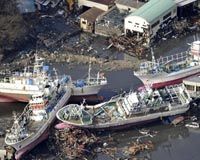| . |  |
. |
Kesennuma, Japan (AFP) March 22, 2011 It's hard to see how business can thrive in the post-tsunami devastation in Japan, but consumer demand is running high -- and Sayuri Miyakawa is determined to supply it. Days after a tsunami reduced her seaside grocery store in Kesennuma to driftwood, Miyakawa was back in business, albeit with no shop, no cash and virtually no produce. With something like half a million people living in ill-equipped, badly stocked evacuation centres along the northeastern coastline, there is a huge need for everything from food to fuel and medicines. Every day, survivors go looking for supplies they can scavenge to supplement the meagre handouts available in the shelters. With transport almost non-existent -- most private vehicles were destroyed and there's no fuel anyway -- they have little choice but to focus their search in what remains of their home towns. And that's where Miyakawa has stepped up. Six days after the disaster, she was able to lay out a small selection of groceries including chocolates, fruit and bottled water, the prized goods presented on a few boxes on the street where her family store once stood. "I'm not sure when I can really restart my business. But I came here today because I thought people needed food. They might not be able to wait for food rations," she told AFP. Less than an hour later, everything was sold out, barring some rice flour which needed fuel and water to cook it. The following day, Miyakawa managed to find a truck to bring more fresh and canned produce -- which sold almost as fast as she could unpack it. "Unless you start somewhere, you cannot start at all," she said cheerfully, busily handing a sack of tomatoes, herbs and apples to a customer. And she's not alone. Other small businesses are trying to resume a similar ad hoc service, selling anything from tools to clothing. One obstacle they have quickly encountered is cash -- the lack of it. While Miyakawa was able to secure her supplies from a wholesaler on credit, individual consumers need ready money and, with no functioning ATMs, cash is hard to come by. Four days after the March 11 quake and tsunami, Kesennuma Shinkin Bank managed to open two of its 12 branches despite the absence of any power. Without computers, bank staff had to use paper ledgers to check the accounts of depositors wishing to withdraw cash. Customers without picture ID cards were interviewed to verify their identity and account balances. "Our institution is small enough that our employees should be able to recognise the faces of most of our clients," said Eiji Fujimura, a sales promotion official. "Nearly half or possibly more people in Kesennuma have accounts with us. We consider ourselves a financial lifeline of this community," said Fujimura, who wore several winter jackets to keep out the cold in the branch office. "We must continue to do what we can to provide services to our clients," he said. After withdrawing some cash, 53-year-old grandmother Akimi Ogata bought milk and diapers that she found on the mostly empty shelves of a damaged grocery store. Ogata's house was not damaged in the tsunami, so several relatives, including her six-month-old grandson, moved in with her. "We didn't need cash on the very first or second day after the quake, but stores are starting to open," she said. "You really need cash at the ready because you never know when you might chance on something to buy." According to a World Bank estimate, Japan's quake and tsunami disaster could cost its economy up to $235 billion, or 4.0 percent of output, and reconstruction could take five years. The four worst affected prefectures account for an estimated six to seven percent of the national economy.
Share This Article With Planet Earth
Related Links Bringing Order To A World Of Disasters A world of storm and tempest When the Earth Quakes
 Desperation tests taboo on theft after Japan tsunami
Desperation tests taboo on theft after Japan tsunamiKamaishi, Japan (AFP) March 20, 2011 Isolated reports of looting by desperate tsunami survivors have emerged in Japan, whose people have been widely applauded for their discipline in the face of appalling adversity. Other countries have noted with admiration, and some envy, the almost total absence of social disorder following the massive March 11 earthquake and ensuing tsunami that has left nearly 20,000 people dead or missing ... read more |
|
| The content herein, unless otherwise known to be public domain, are Copyright 1995-2010 - SpaceDaily. AFP and UPI Wire Stories are copyright Agence France-Presse and United Press International. ESA Portal Reports are copyright European Space Agency. All NASA sourced material is public domain. Additional copyrights may apply in whole or part to other bona fide parties. Advertising does not imply endorsement,agreement or approval of any opinions, statements or information provided by SpaceDaily on any Web page published or hosted by SpaceDaily. Privacy Statement |